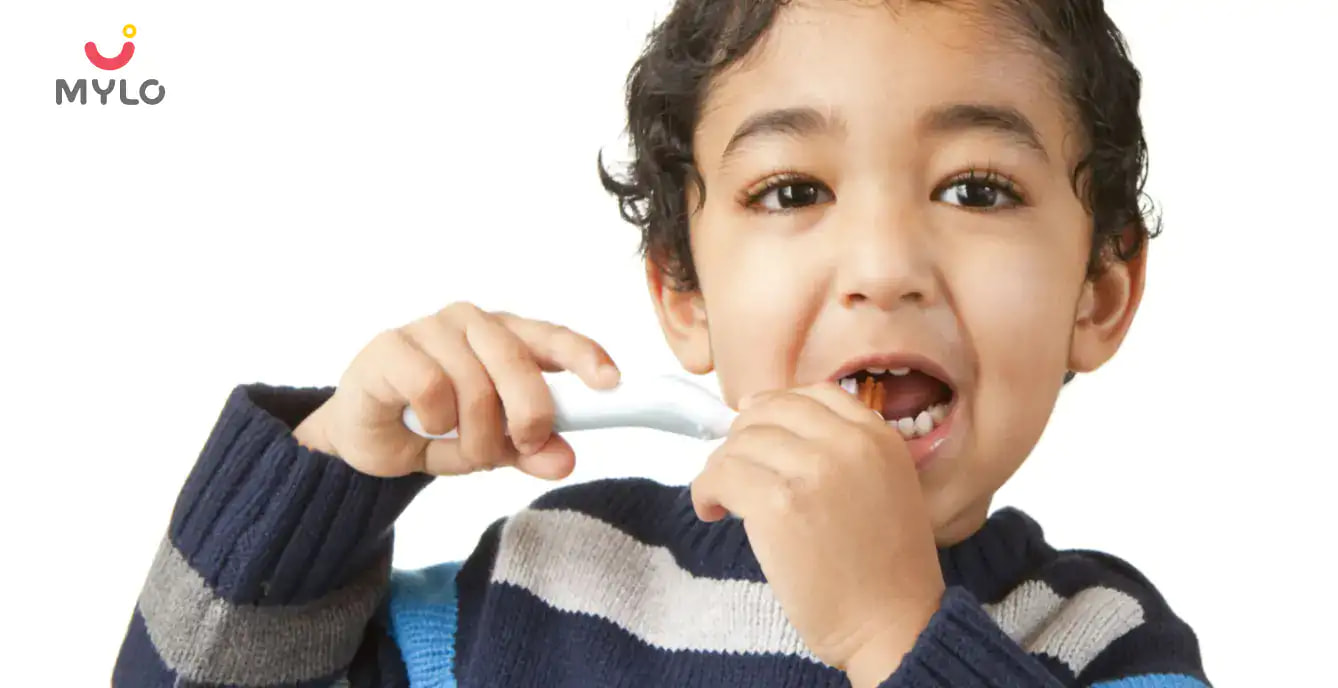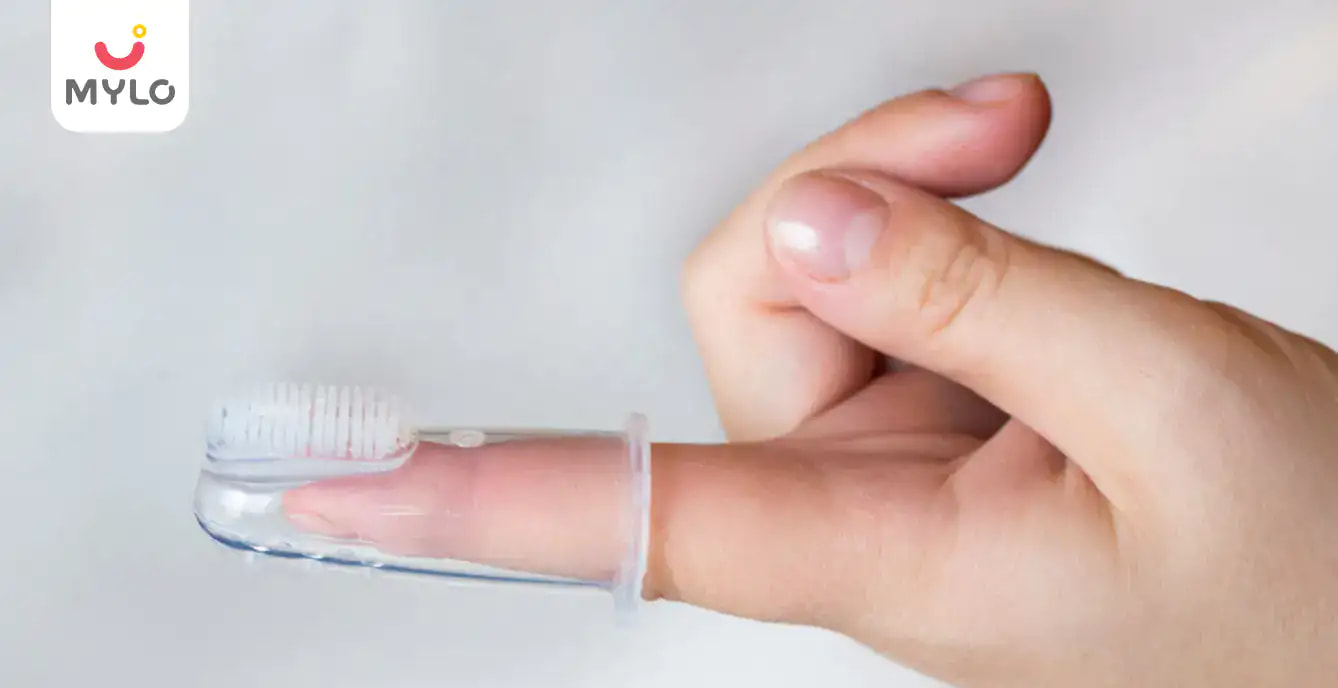Home

Teething

7 Signs of Teething Troubles in Your Little One
In this Article
Teething
7 Signs of Teething Troubles in Your Little One
Updated on 3 November 2023
Teething in babies can start between 6-12 months, though in some cases it may appear a little later. In case teething starts later, remember that every child is different. So, the age range may be 6-12 months, but the first tooth may appear around 14 months.
Though if you feel concerned about your baby’s teething issues, speak to your healthcare specialist.
Duration of the teething process
The total time period may last around two years i.e., till your child turns 2 or 3 and he/she will have a full set of 20 teeth.
When they turn around 6 or 7 years, the baby teeth fall out making space for the permanent teeth which take years for all 32 teeth to appear.
Signs of Teething
There are times when a tooth will appear without any symptoms while in some cases the teething symptoms can start 3-4 days prior.
As the teeth appear, the symptoms can include the following:
1. Low-grade fever
Teething can cause a slight increase in the body temperature but is unlikely to reach over 101 degrees. In case your baby has temperature of 101 degrees or 100.4 degrees (baby is under 3 months), consult your doctor to determine the fever’s cause.
2. Chewing
When your baby experiences teething, he/she may gnaw on things and even their own fingers to ease the discomfort felt. In such cases, you can massage their gums with your clean finger or use a cold pacifier for the baby to use.
3. Swollen gums
There may be some area on the gums that are swollen and can be felt if you rub a finger on their gums and a slight bump is felt from where a tooth is about to sprout.
4. Refusing to eat
Your baby wouldn’t want to eat anything during these times. But don’t worry offer items which are easy to swallow to ensure he/she receives adequate nutrition.
5. More Drooling
It is a common sight to see babies drool a lot. The cause of drooling is the extra saliva which is being created to help lubricate the sore gums and reduce the irritation.
6. Crankiness
Babies get cranky during this period as a result of the pain and discomfort. So, try to help reduce their pain by regularly massaging the gums with clean hands and giving them a chilled teething toy to chew on.
7. Frequent waking up (especially during the night)
Unfortunately, babies can show teething signs by frequently waking up at night. It is due to the discomfort of a growing tooth. Try to help them settle properly by showing that you care for them and will use every trick in the bag to help soothe their teething woes.
References:
1. Memarpour M, Soltanimehr E, Eskandarian T. (2015). Signs and symptoms associated with primary tooth eruption: a clinical trial of nonpharmacological remedies. NCBI
2. Karjiker, YI, & Morkel, JA. (2020). Teething symptoms and management during infancy - A narrative review. South African Dental Journal



Written by
Parul Sachdeva
A globetrotter and a blogger by passion, Parul loves writing content. She has done M.Phil. in Journalism and Mass Communication and worked for more than 25 clients across Globe with a 100% job success rate. She has been associated with websites pertaining to parenting, travel, food, health & fitness and has also created SEO rich content for a variety of topics.
Read MoreGet baby's diet chart, and growth tips

Related Articles
Related Topics
RECENTLY PUBLISHED ARTICLES
our most recent articles

Diet & Nutrition
গর্ভাবস্থায় আলুবোখরা: উপকারিতা ও ঝুঁকি | Prunes During Pregnancy: Benefits & Risks in Bengali

Diet & Nutrition
গর্ভাবস্থায় হিং | ঝুঁকি, সুবিধা এবং অন্যান্য চিকিৎসা | Hing During Pregnancy | Risks, Benefits & Other Treatments in Bengali

Women Specific Issues
স্তনের উপর সাদা দাগ: লক্ষণ, কারণ এবং চিকিৎসা | White Spots on Nipple: Causes, Symptoms, and Treatments in Bengali

Diet & Nutrition
গর্ভাবস্থায় পোহা: উপকারিতা, ধরণ এবং রেসিপি | Poha During Pregnancy: Benefits, Types & Recipes in Bengali

Diet & Nutrition
গর্ভাবস্থায় মাছ: উপকারিতা এবং ঝুঁকি | Fish In Pregnancy: Benefits and Risks in Bengali

Diet & Nutrition
গর্ভাবস্থায় রেড ওয়াইন: পার্শ্ব প্রতিক্রিয়া এবং নির্দেশিকা | Red Wine During Pregnancy: Side Effects & Guidelines in Bengali
- ইনার থাই চ্যাফিং: কারণ, উপসর্গ এবং চিকিৎসা | Inner Thigh Chafing: Causes, Symptoms & Treatment in Bengali
- গর্ভাবস্থায় ব্রাউন রাইস: উপকারিতা ও সতর্কতা | Brown Rice During Pregnancy: Benefits & Precautions in Bengali
- Velamentous Cord Insertion - Precautions, Results & Safety
- Unlock the Secret to Flawless Skin: 7 Must-Have Qualities in a Face Serum
- Unlock the Secret to Radiant Skin: How Vitamin C Serum Can Transform Your Complexion
- Gender No Bar: 10 Reasons Why Everyone Needs a Body Lotion
- Unlock the Secret to Radiant Skin How to Choose the Perfect Body Lotion for Your Skin Type
- Top 10 Reasons to Apply a Body Lotion After Every Bath
- Communication in Toddlers: Milestones & Activities
- How to Improve Vocabulary for Toddlers?
- A Comprehensive Guide to Understanding Placenta Accreta
- Vulvovaginitis in Toddlers Causes, Symptoms and Treatment
- A Comprehensive Guide to Understanding Cerebral Palsy in Children
- Bitter Taste in Mouth During Pregnancy: Understanding the Causes and Remedies


AWARDS AND RECOGNITION

Mylo wins Forbes D2C Disruptor award

Mylo wins The Economic Times Promising Brands 2022
AS SEEN IN

- Mylo Care: Effective and science-backed personal care and wellness solutions for a joyful you.
- Mylo Baby: Science-backed, gentle and effective personal care & hygiene range for your little one.
- Mylo Community: Trusted and empathetic community of 10mn+ parents and experts.
Product Categories
baby carrier | baby soap | baby wipes | stretch marks cream | baby cream | baby shampoo | baby massage oil | baby hair oil | stretch marks oil | baby body wash | baby powder | baby lotion | diaper rash cream | newborn diapers | teether | baby kajal | baby diapers | cloth diapers |








